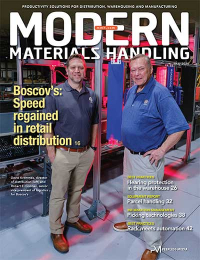Enhancing trade by cutting red tape
Latest Material Handling News
On the eve of the G-20 Summit in Seoul this week, the International Finance Corporation and the World Bank have noted that small- to medium-sized U.S. shippers may have an easier time of “going global” in the future.
In the past year, governments in 117 economies carried out 216 regulatory reforms aimed at making it easier to start and operate a business, strengthening transparency and property rights, and improving the efficiency of commercial dispute resolution and bankruptcy procedures.
This is a finding of Doing Business 2011: Making a Difference for Entrepreneurs, the eighth in a series of annual reports published by IFC and the World Bank. The report ranks 183 economies on key aspects of business regulation for domestic firms.
Globally, doing business remains easiest in the high-income economies of the Organization for Economic Co-Operation and Development and most difficult in Sub-Saharan Africa and South Asia. But developing economies are increasingly active. In the past year, 66 percent reformed business regulation, up from 34 percent six years earlier.
In the past five years, about 85 percent of the world’s economies have made it easier for local entrepreneurs to operate, through 1,511 improvements to business regulation. Doing Business 2011 pioneers a new measure showing how much business regulation has changed in 174 economies since 2005. China and India are among the top 40 most-improved economies. Among the top 30 most-improved economies, a third are from Sub-Saharan Africa.
Worldwide, more than half the regulatory changes recorded in the past year eased business start-up, trade, and the payment of taxes. Many of the improvements involve new technologies. “New technology underpins regulatory best practice around the world,” said Janamitra Devan, Vice President for Financial and Private Sector Development for the World Bank Group. “Technology makes compliance easier, less costly, and more transparent.”
For the fifth year running, Singapore leads in the ease of doing business, followed by Hong Kong SAR China, New Zealand, the United Kingdom, and the United States. Among the top 25 economies, 18 made things even easier over the past year.
“Governments worldwide have been consistently taking steps to empower local entrepreneurs,” said Neil Gregory, Acting Director, Global Indicators and Analysis, World Bank Group. “The economies most affected by the financial crisis—especially in Eastern Europe—have been targeting regulatory reforms over the past year to make it easier for small and medium-size enterprises to recover and to create jobs.”
Kazakhstan improved business regulation for local entrepreneurs the most in the past year. This year’s list of the 10 most-improved economies also includes three in Sub-Saharan Africa—Rwanda (a consistent reformer of business regulation), Cape Verde, and Zambia—as well as Peru, Vietnam, Tajikistan, Hungary, Grenada, and Brunei Darussalam.

Article Topics
Blogs News & Resources
Latest in Materials Handling
MHEFI awards record-breaking $231,700 in scholarships to 61 students ALAN opens nominations for 2024 Humanitarian Logistics Awards Kenco to install an AutoStore system at its Jeffersonville, Ind., DC Schneider Electric rolling out WMS and TMS solutions from Manhattan Associates at scale Leaders Q & A with Bryan Ferguson: Resurgence of RFID technology Tom Panzarella appointed Chief Technology Officer at Seegrid Mallard Manufacturing joins the MacLean-Fogg family of companies More Materials HandlingAbout the Author
Subscribe to Materials Handling Magazine

Find out what the world's most innovative companies are doing to improve productivity in their plants and distribution centers.
Start your FREE subscription today.
May 2024 Modern Materials Handling

Latest Resources










